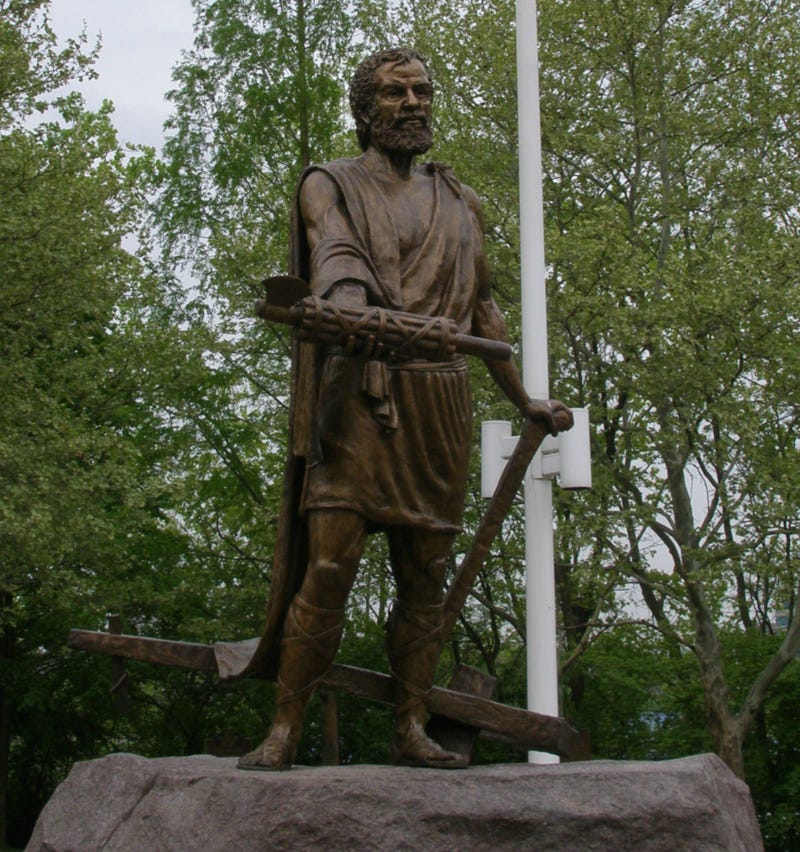The Tragic Honor of an American Cincinnatus
Omnia relinquit servare rempublicam "He gave up everything to serve the Republic”
Long after he retired from public life, a group of Roman senators approached Cincinnatus’s small farm. According to the legend, they found him in his field, holding his plow. Rome was under attack. Its army was surrounded on the battlefield, and Rome was paralyzed by infighting and inequality. The young, unequal republican experiment was not capable of responding to the pressing threat of an invading army amid domestic division.
The Senate appointed the elder Cincinnatus dictator with total authority for six months.
Cincinnatus raised an army in Rome and marched to relieve the trapped soldiers. With his superior numbers, Cincinnatus was able to surround the enemy army that had originally surrounded his fellow Romans. The enemy surrendered, and Cincinnatus spared all but the opposing leaders.
Cincinnatus returned to Rome a hero. He still had total authority, and if he wanted to extend his term, who would stop him? Cincinnatus was the savior of the city, and he had an army. But after just sixteen days as dictator, he disbanded the army and handed power back to the Senate. Cincinnatus returned to his farm, and he took up his plow.
Cincinnatus was approximately 61 years old when he became dictator. Among the military and political legends of Rome, he is perhaps the only elder statesman. Caesar was killed at 55. Augustus was 36 when he became emperor. Cincinnatus was the only one to ascend into this pantheon when he was in the twilight of his life.
Statue of Cincinnatus in Cincinnati Ohio
Cincinnatus has been the model of civic virtue and selfless service for over two thousand years. Washington and the founders clearly had him in mind throughout the Revolutionary War. When Washington relinquished his command of the Continental Army, and when he later stepped down as President after two terms, the public hailed him as an “American Cincinnatus.”
In 1783, top officers of the Continental Army founded the Society of the Cincinnati—the plural form of Cincinnatus— as the nation’s first civic organization dedicated to preserving the values of the American Revolution.
But what if Cincinnatus didn’t want to step down? Not because he gave into the temptation of absolute power, but out of an earnest sense of responsibility? What if the existential threat to the Roman Republic did not disappear in two weeks? It would be hard to know for sure after just sixteen days. Even in the aftermath of a decisive defeat, the remnants of the enemy army could linger on the fringes of Rome for months or years.
What if the divisions within the Republic continued to fester? Foundational political questions do not resolve over a fortnight, let alone six months. Is it tyrannical to want to finish what you set out to accomplish?
History sings the virtue of Cincinnatus and Washington because they were successful and showed restraint at the right time. Their victories had clear endpoints: the surrender of the invading army, peace with Britain, and the end of a second term. They were strong enough to blow past those limits if they wanted. They could have been kings. Instead, history remembers how they restrained themselves in service of a republic.
Perhaps President Biden, after enough time has passed, will be remembered in the same way. He ran in 2020 to defeat Donald Trump and repair the damage Trump caused at home and abroad. President Biden succeeded. He defeated Trump, and he went on to pass a record amount of legislation for our climate, infrastructure, and industry.
History may record his decision not to run again as confirmation of his success and restraint at the right time.
I hope we will tell a different story. It would be easier to confine this narrative to the neat order of events where history and myth meet. It is more convenient to ignore all that has been left undone. In my view, remembering the stakes of Biden’s unfinished legacy reveals something about the moment when Cincinnatus and Washington returned to their farms.
The Roman Republic was still divided and profoundly unequal, leaving itself vulnerable to threats nearby. The nascent United States wrestled with how to establish a nation founded on the belief that “all men are created equal” as Washington’s “farm” was a plantation that enslaved over 300 people.
The work Joe Biden began is unfinished. Donald Trump is the Republican presidential nominee once again, and he poses an arguably greater threat to American democracy than he did four years ago. The future of American democracy, economic opportunity, and global alliances are all at stake.
It is noble to give up power when there is no challenge to your authority and your work is finished. But perhaps it is more honorable to relinquish control at a time when your work is unfinished.
It is the humble recognition, in service of the country over ego, that you have done enough. Though there is more to do, though all you have sacrificed for could be undone, your work is done. And when the grief of this unresolved ending settles, it may be with hope and faith that you allow others to take responsibility for what you started.
The virtue of the American Cincinnatus is vulnerability, not strength. Washington’s greatest acts, first as general and then as President, were his resignations. Washington knew the risks. In his farewell address, Washington was concerned by the rising regional competition, factionalism, and international meddling in the young republic.
But by stepping down, Washington accepted what so many revolutionary generals refuse— the nation’s future strength begins with a leader’s vulnerability.
President Biden addresses his decision to pass the torch in the Oval Office.
The health of a democracy requires a leader’s willingness to give up power, before and after elections. As President Biden has said, “You can’t love your country only when you win.” Perhaps the best way to love a democracy is to let it go.
If the Revolution and American democracy were complete when Washington stepped down, as the legend of Cincinnatus might imply, then our role today is merely historical preservation and honoring his virtue. But if the truth of Cincinnatus’s courage lies in what remains unfinished, then all of us have a role in furthering the Revolution and the American experiment toward a “more perfect union.”
Joe Biden is an American Cincinnatus. Take up your plough, Mr. President. And let us finish what you started.







